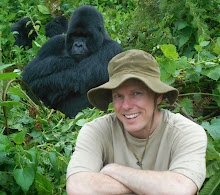
More than 60 days in, the cleanup of the Gulf is an emerging colossus, a sprawling network of communication and manpower, of truck and boat. Reporting for duty and returning to Venice, I find an ID network which necessitates standing in line, posing for a camera. I find the overall effort expanding like the creeping sheen itself, like the inexorable footprint of man. I board the boat at 22:00, the m/v Mary Jean. The company of my employ now has multiple vessels engaged in the cleanup, and I'm here to fill in on the Mary Jean, an antique of a crewboat, built 125 ft. long in 1980. I'll be on the night watch, but we're only running by day so I take a pillow to the wheelhouse bench and sleep till nearly sunrise.
We back down slip one in Tiger Pass to the GIS Dock, Rick driving the boat. Morning traffic has improved in my time away, boats like Mary Jean now serving as the middlewoman and hauling supplies to the fish-turned-skimmer boats who remain offshore, ostensibly skimming oil by day, banking up to $5,000/day from BP, anchoring by night among the barrier islands. I make myself useful and handle a line, secure the boat and gangway, and a crew of four board. There's a portable generator on deck, 9,200 lbs, it says, just aft of the wheelhouse, which sits forward on the late model Camcraft, a loading deck aft covered with boards. A 20-foot container/freezer sits on the centerline just aft of the generator, and a forklift drops pallets of groceries on the stern. The crew begins to peal plastic wrapping, load boxes into the freezer.
The lead captain Rick, a veteran of private yachts and ocean crossings in addition to supply boats in the Gulf, resides in Florida but hails from Boston and maintains the accent. As I learn specifics, he appears to coordinate a great deal of logistics, claiming things wouldn't get anywhere without his input. He classifies the cleanup as a "clustah f&%@". With BP picking up the tab for everything, workers are making off with coolers, lifejackets, groceries.
After 10:00 at departure, we run south in the Mississippi bound for Task Force 5, the skimmers divided into five packs, each with a workboat to store boom and coordinate deliveries, pick ups and communication. The small fleets migrate delta waters in search of coastal oil, four of them east of the river toward Breton Sound, one west. Aluminum skiffs, the "responder" boats work the marsh, retrieve soiled boom and take it to the "floating city", a network of barges moored just below the Baptiste Collete jetties on the green side of the channel.
Approaching the Head of Passes where the great river fingers into the Gulf, a new de-con station inspects boat hulls for oil. We take SW Pass, the main ship channel, and its mostly empty, a pleasant cruise interrupted only by small vessels for whom we must kill our wake. We hang a left just past pilot town at the end of the jetties, at the red 4. We head NE and reach the workboat on VHF 68, heave to, and the fishing boats come to us, catching lines stern to stern. Our four hands for the day do the offloading, although I pitch in at times. It's amazingly hot, even on the water, diesel exhaust mixing with water vapor, creating a repulsive blend that sends me gasping. The rest of the guys don't pay it mind, instead smoke cigarettes during breaks in the action.
On the way in and up the river, the Capt. Jim Rhodes, a 40-ft crewboat, makes an urgent call to river traffic on 67, he's taking on water and going down, attempting to cross the one mile stretch from Baptiste Collette to the Venice Jump. I meet the captain later, and he tells me his engines began to stall 1/3 mile above the Jump. He beached and saved the vessel, unfortunately landing on rock just north of the intersection.

No comments:
Post a Comment